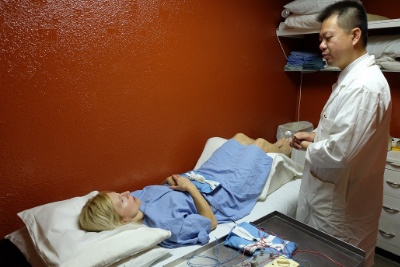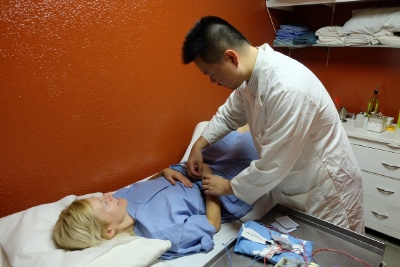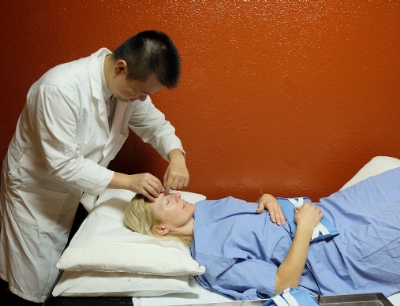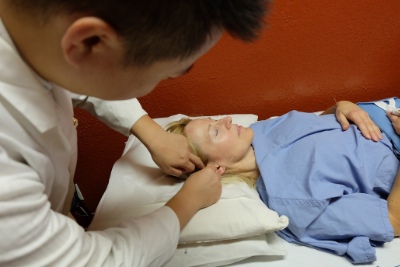Q: My family doctor recently refers me to an acupuncturist, but I am afraid of needles. Is acupuncture safe?

A: A common anxiety expressed by new patients is whether it is safe to have the body punctured by needles. This is understandable. The answer would have to be that if the practitioner does not know what he or she is doing, it is possible to inflict injury with an acupuncture needle. A fully trained and experienced practitioner knows how to use needles safely and effectively, and avoid any potential danger areas. However, with the correct needling techniques there is no danger of this whatsoever. The importance of seeking a registered acupuncturist with the College of Traditional Chinese Medicine Practitioners and Acupuncturists of BC cannot be overstated. In the hands of such practitioners, acupuncture is very safe and effective.
Q: I know acupuncture has proven to be a very successful treatment for pain relief. Is it beneficial for other health conditions?
 A: The World Health Organization has cited 104 different conditions that acupuncture can treat, including migraines, sinusitis, common cold, tonsillitis, asthma, inflammation of the eyes, addictions, myopia, duodenal ulcer and other gastrointestinal disorders, trigeminal neuralgia, Meniere's disease, tennis elbow, paralysis from stroke, speech aphasia, sciatica, osteoarthritis, variety of rheumatoid conditions. There is also evidence to suggest that acupuncture is valuable in the treatment of environmentally induced illness due to radiation, pesticide poisoning, environmentally toxic compounds, and air pollution.
A: The World Health Organization has cited 104 different conditions that acupuncture can treat, including migraines, sinusitis, common cold, tonsillitis, asthma, inflammation of the eyes, addictions, myopia, duodenal ulcer and other gastrointestinal disorders, trigeminal neuralgia, Meniere's disease, tennis elbow, paralysis from stroke, speech aphasia, sciatica, osteoarthritis, variety of rheumatoid conditions. There is also evidence to suggest that acupuncture is valuable in the treatment of environmentally induced illness due to radiation, pesticide poisoning, environmentally toxic compounds, and air pollution.
Q: I am interested in acupuncture or Traditional Chinese Medicine, how can I look for a qualified member?
A: Traditional Chinese Medicine and Acupuncture is a recognized and regulated profession under the B.C. Health Professions Act. You can look up or inquire a licensed member in your vicinity through www.ctcma.bc.ca or telephone the College of Traditional Chinese Medicine Practitioners and Acupuncturists of British Columbia (CTCMA) at (604) 638-3108.
Q: I have migraine headache for years. Two weeks ago I got the flu and I am not feeling well ever since. My headache is getting worse. Yesterday I sprained my lower back at work. What should I tell my acupuncturist?
 A: Acupuncture is a holistic approach that is meant to treat the person instead of a particular symptom. While you decide to have acupuncture treatment, you should put down all your complaints and medical history and report to the acupuncturist. Those complaints may all connect in some extend. The practitioner would then design an individual program for you base on what the disharmony or disorder you have, and treat those problems with the same session. From your headache to flu, your lower back pain, and whatever, they would all be taken care of.
A: Acupuncture is a holistic approach that is meant to treat the person instead of a particular symptom. While you decide to have acupuncture treatment, you should put down all your complaints and medical history and report to the acupuncturist. Those complaints may all connect in some extend. The practitioner would then design an individual program for you base on what the disharmony or disorder you have, and treat those problems with the same session. From your headache to flu, your lower back pain, and whatever, they would all be taken care of.
Q: I know acupuncture is beneficial for many health conditions, does it also have effects on AIDS?
A: Although acupuncture does not cure AIDS, it is often used with Chinese herbs to improve a patient's immune function and to reduce uncomfortable or dangerous symptoms, including night sweats, fatigue, and digestive disturbances. However, acupuncture significantly extends the life span and improve the quality of life in AIDS patients.
Q: I have heard about acupuncture detoxification programs dealing with addiction. Is acupuncture effective in this regard?
A: Acupuncture is very effective in the treatment of opium and heroin addictions, and has a significant response in alleviating the symptoms of withdrawal. This is confirmed by studies done recently by the U.S. National Acupuncture Detoxification Association (NADA) which recommends acupuncture be widely utilized to treat substance abuse. In addition, acupuncture claims high success rates with cigarette addiction.
Q: I was prescribed some dry herbs by a doctor of Traditional Chinese Medicine, what is the proper way to prepare it?
 A: 1. Place the herbs in a non-metal cooking pot, (e.g. clay pot, glass pot, pyrex, etc.) with cold water (1.5-2 litres of water, depending on the size of the pot). Soak it for half an hour or so.
A: 1. Place the herbs in a non-metal cooking pot, (e.g. clay pot, glass pot, pyrex, etc.) with cold water (1.5-2 litres of water, depending on the size of the pot). Soak it for half an hour or so.
2. Bring the water to boil and cover the pot tightly, then simmer it until it reduces to approximately 2 cups. Strain the decoction out and save it.
3. Re-cook the leftover herbs by adding another 1 litre of water and make 2 cups of decoction with the above-mentioned procedure.
4. Mix the total 4 cups of decoction (from steps 2 and 3) together. This is a two-day supply and is ready to serve. Keep decoction refrigerated.
5. Two cups a day. Drink it warm.
Q: What is Shi Liao or Food Therapy?
A: Food Therapy has a recorded history of more than 3,000 years and is the most basic treatment in Chinese Medicine to prevent and cure disease. It is the preparation of medicinal food dishes, using selected food ingredients and superior herbs, to derive the necessary nutrients to treat specific health conditions. It is the product of accumulated experience from generation after generation of close monitoring and refinement of recipes on people. Each recipe is tried-and-true and the natures, characteristics, therapeutic effects and impacts on people are fully known. Besides, most recipes are very delicious and they are specialties in the Chinese cuisine.
Q: I have heard that Traditional Chinese Medicine and acupuncture can be beneficial to animals, do you have any information for that regard?
A: Animals are usually presented with an entering complaint. Initial treatment is usually directed towards correcting the more acute problem; however, longer term balancing of the underlying constitutional imbalance is often required in order to keep the initial complaint from recurring.
Traditional Chinese Medicine is aimed at restoring this natural balance. It consists of Chinese herbal medicine, acupressure, and food therapy; acupuncture and so on. They can be used effectively on its own or in conjunction with Western medications. Treatments should only be employed under the instruction and supervision of an appropriately trained veterinarian.
For acupuncture treatment, the placement of needles causes very little, if any, discomfort. Once needle is situated it is painless. During a treatment most animals become very calm and relaxed; they may become sleepy and yawn. The number of needles, their placement and needling technique employed varies from case to case, as does the duration of treatment. The duration of treatment can be as short as a few seconds to as long as thirty minutes. The number of sessions and their timing varies with the problem being treated. Most cases will need up to ten treatments at varying time intervals; however some will require only one or two treatments.
Reference book: Four Paws Five Directions: A Guide to Chinese Medicine for Cats and Dogs by Cheryl Schwartz ISBN 0-89087-790-4
Q: I am ready to make an acupuncture appointment, is acupuncture covered by BC Medical?
A: Yes. Acupuncture is covered by the B.C. Medical Services Plan and most extended health insurance, such as WCB, ICBC, and Veteran Affairs. Please contact your insurance policy or your claim representative, and bring your claim number with you to the appointment.
Q: What is the insurance claim procedure?
A: There are two major claim procedures: In the first, the insurer asks you to pay for your treatment and to submit the receipts for reimbursement. For this policy, you need to make sure that your insurance company covers acupuncture. Know how much they pay for each treatment and how much they cover per year. The other one is, the where the insurer authorizes your acupuncturist to be directly billed to them. For this policy, you need to bring your claim number, name/phone number of your claim representative, and your family doctor's referral.
Q: What kind of insurance policy do I have?
A: You can check with your employer or your insurance company. Your acupuncturist would be happy to find that out for you too.
Q: Is it OK to take herbs at the same time as prescription drugs?
A: In most cases it is OK to take herbs and prescription drugs on the same day, however, it is advisable to allow a couple of hours in between to take the herbs and drugs so that each of them has enough time to work in the system and achieve full benefit. Please keep in mind that herbs are medicine too, there will be a potential for negative interactions with prescribed drugs. I would recommend that to discuss any medications you are taking with both your family doctor and Chinese herbalist before you consume herbs. TCM Practitioners licensed by theCollege of Traditional Chinese Medicine Practitioners & Acupuncturists of British Columbia are competent to provide you with advice and serve the best of your health interest.

